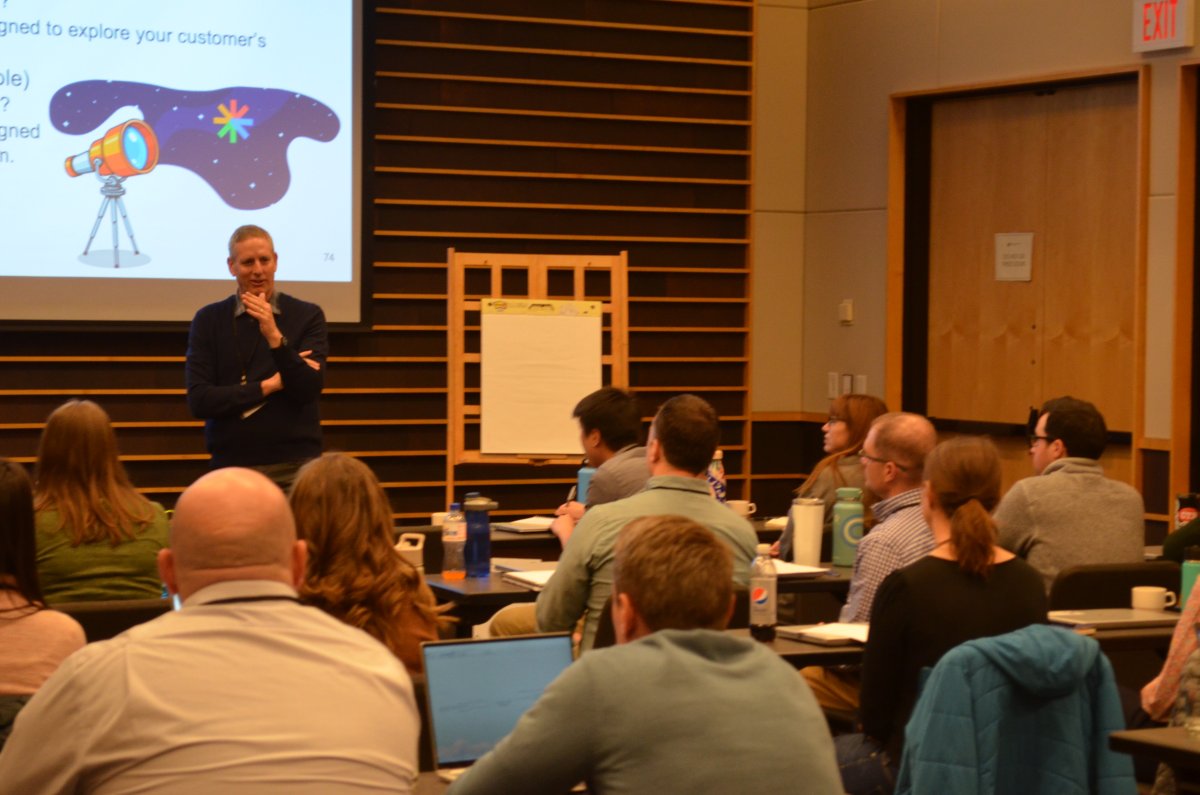TLI Dishes Up Technical Leadership Training for General Mills Employees

Technical leadership was on the menu last week at the U of M campus as nearly 30 General Mills food scientists and engineers gathered for the third offering of the Technical Leadership Essentials (TLE) course – a seminar in leadership fundamentals hosted by the U’s Technological Leadership Institute.
Dubbed “TLE 3.0”, the course was designed to acquaint leadership-track employees with the fundamentals of technology management, strategic planning and persuasive communication. Taught by instructors from the Technological Leadership Institute at the University of Minnesota, the course was specifically tailored for GMI employees who work in largely technical fields. The grounding in business fundamentals will help to prepare these employees to managing their own teams, departments and divisions within GMI.
Students who complete the course will be able to connect technical insights and capabilities to drive business opportunities, said Travis Thul, operations director for TLI.
“Many of the basics are taken from our graduate programs in leadership,” Thul said. “We’ve made a number of modifications specifically for General Mills employees, but the lessons are universal.”
The course was divided into a series of modules spread over the week-long program, each taught by a different instructor. Topics included innovation and growth; leadership and team design; technology management; platforms and architecture; managing and negotiating with Internal and external partners; and IP strategy.
A final module – business communications and storytelling -- was put to immediate use when students pitched ideas to the class as a whole.
The students were engaged and interested throughout the week, peppering the instructors with questions and sharing their own experiences in the workplace.
Associate R&D Principal Scientist Sarah Schramke says she had first heard about the course from colleagues, and was glad to have been offered a chance to attend from her manager. “I wanted to develop my ability to think strategically to help the areas of the business that I support, and to help me grow my career.”.
“It’s been very exciting, very motivating,” she said of the course. “I’m looking forward to applying a lot of what I’ve learned here to the job.”
Associate R&D Principal Packaging Engineer Samih Zaman has been with GMI for 15 years and plans to stay on a technical track in the company. Nevertheless, he felt the material would benefit him in his day-to-day job.. “It seemed like a great opportunity,” he said. “It’s been a long time since I’ve been in a classroom, but I’m really enjoying it.”
Qing Bin, Associate Principal Scientist in GMI’s pet food division, heard about the training from past participants and was recommended for TLE 3.0 by her manager. “I really liked the structure of the classes,” she said. “The pre-work we were given by the instructors helped us make the most of the time spent in the classroom. What we’re learning is directly applicable to what I do at General Mills.”
GMI-focused content has increased a great deal since TLE 1 four years ago, explained Eric Engesser, Director of ITQ Global Cereals & Snacks Technology at GMI.
“Some of the most consistent feedback we got from TLE 1 was, ‘We’d like more examples from company history,” he said. “We’ve since increased the GMI content to the point where I’d say 70% of the examples and case studies come directly from General Mills. We’re introducing new concepts by using material that students are already familiar with, and that increases their comfort level significantly.”
Another surprise from TLE 1: students were returning from the course ready to use concepts that their bosses weren’t familiar with. In order to get everyone on the same page, a one-day session for managers, last year’s TLE 2.5, was arranged to introduce the concepts that they needed to know.
Students began working in groups with members of their cohort weeks before TLE 3.0 officially began. Each group collaborated on a capstone project, in which they take what they’ve learned and apply it to the workplace.
The capstone projects the students selected needed to address a new or existing technology-centric problem, said Engesser. They generally fall into three categories: a major cost-savings initiative that will require cross-functional efforts; a cost-saving innovation that will offer new revenue; or a measure that aligns with the company’s strategic targets in a particular area – for example, GMI’s push to achieve 100% recyclable packaging.
Like every other aspect of the TLE program, the resulting capstone projects are carefully measured. “We track costs saved or revenue generated from every student project,” Engesser said.
Many of the concepts presented in the course have been taught by TLI since its founding in 1987. Part of the U of M’s College of Science and Engineering, TLI provides leadership training for people working in technical fields and offers three Master’s degrees: Management of Technology, Security Technologies and Medical Device Innovation. TLI also offers short courses and certificates in particular areas, such as power system electrification and medical device cybersecurity.